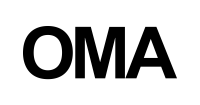MEETT Toulouse Exhibition and Convention Centre
France
© Marco Cappelletti, Courtesy of OMA
Architecture, urbanism, and cultural analysis
OMA is a leading international partnership practicing architecture, urbanism, and cultural analysis. OMA’s buildings and masterplans around the world insist on intelligent forms while inventing new possibilities for content and everyday use. AMO, a research and design studio, works in areas beyond architecture that today have an increasing influence on architecture itself: media, politics, renewable energy, technology, publishing, fashion.
OMA is led by nine partners - Rem Koolhaas, Ellen van Loon, Reinier de Graaf, Shohei Shigematsu, Iyad Alsaka, David Gianotten, Chris van Duijn, Ippolito Pestellini Laparelli, Jason Long - and maintains offices in Rotterdam, New York, Beijing, Hong Kong, Doha and Dubai.
OMA-designed buildings currently under construction include, Taipei Performing Arts Centre, Qatar National Library, Qatar Foundation Headquarters, Bibliothèque Multimédia à Vocation Régionale in Caen, Bryghusprojektet in Copenhagen, Musée National des Beaux-Arts du Québec, Prince Plaza in Shenzhen, and Faena Arts Center in Miami.
OMA's recently completed projects include Timmerhuis, new home for Rotterdam’s municipal offices (2015); Garage Museum of Contemporary Art in Moscow (2015); Fondazione Prada in Milan (2015); G-Star Headquarters in Amsterdam (2014); Shenzhen Stock Exchange (2013); De Rotterdam, a large mixed-use tower in the Netherlands (2013); CCTV Headquarters in Beijing (2012); New Court, the headquarters for Rothschild Bank in London (2011); Milstein Hall at Cornell University in Ithaca, New York (2011); and Maggie's Centre, a cancer care centre in Glasgow (2011). Earlier buildings include Casa da Música in Porto (2005), Seattle Central Library (2004), and Netherlands Embassy in Berlin (2003).
AMO often works in parallel with OMA's clients to fertilize architecture with intelligence from this array of disciplines. This is the case with Prada: AMO's research into identity, in-store technology, and new possibilities of content-production in fashion helped generate OMA's architectural designs for new Prada epicenter stores in New York and Los Angeles. In 2004, AMO was commissioned by the European Union to study its visual communication, and designed a coloured "barcode" flag - combining the flags of all member states - that was used during the Austrian presidency of the EU.
AMO has worked with Universal Studios, Amsterdam's Schiphol airport, Heineken, Ikea, Condé Nast, Harvard University and the Hermitage. It has produced exhibitions at the Venice Architecture Biennale, including The Gulf (2006), Cronocaos (2010) and Public Works (2012) and for Fondazione Prada including When Attitudes Become Form (2012) and Serial and Portable Classics (2015). AMO, with Harvard University, was responsible for the research and curation of the 14th Venice Architecture Biennale and it’s principle publication Elements. Other notable projects are a plan for a Europe-wide renewable energy grid; Project Japan, a 720-page book on the Metabolism architecture movement (Taschen, 2010); and the educational program of Strelka Institute in Moscow.
Approach to Design & Architecture
The main objective of any design exercise executed within the firm is to provide the client with new, original concepts and a practical architecture with, occasionally, visionary ambitions. In all projects OMA strives to go beyond the standard solution and is consequently able to redefine typologies. Our strategy to tackle projects is based on two fundamental principles: research and collaboration.
Within research, OMA’s philosophy rejects any rush to architectural form. It is our proven experience that by taking adequate time to think with our clients before we start to ‘design’, we can ultimately accelerate the design process and provide buildings of greater quality for a given budget. Working in an initial research and programming phase that can data collection, research of significant precedents (both good and bad), we can identify the core questions and jointly create solutions without confusing them with reactions to architectural proposals. As an example, OMA has applied this method of research successfully in the design process of the Seattle Public Library. From this research, it has been found that given the development of ‘new media’, the classical library concept is predisposed to considerable adjustments.
During every phase of the design process, OMA leads an extended series of intimate collaborations—brainstorm sessions, presentations and workshops—between clients, engineers, architects and other crucial participants of intellectual collaborations such as curators, sociologists, and anthropologists mobilized by our AMO think tank; as well as practical collaborators such as cost estimators, construction managers, contractors, and specialty consultants. Through these events, programmatic and engineering concepts are fully integrated in the formation of the initial design concepts, rather than being an ‘afterthought’ to aesthetic imperatives; this provides the client with the maximum built quality. By means of this approach, the knowledge of all advisors can be used to come up with an optimal design from which all criteria have been analyzed. The client can be an active member within the design team and during the workshops. The design is therefore a product, which is realized in close collaboration with the client.
OMA believes strongly in design as a process, and approaches each condition imposed on a project as an opportunity rather than a constraint. This is the attitude with which we approach codes, regulatory agencies, costs, and most importantly, the unique challenges and requirements of any given program. Addressed skilfully, normally restrictive factors have assisted OMA to provide innovative architecture while meeting tight budgets and rigorous design and construction schedules.
- Categoria
-
- Architects
- Localitzacions
-
Rotterdam, Netherlands
- Doha, Qatar
- Hong Kong, China
- New York, USA
- Queensland , Australia
- Treballadors
- 300
- Lloc web
- www.oma.eu
- Fundat
- 1975
-
